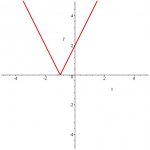I'm trying to find the root of the first derivative of f(x) = (x + 1)|x + 1|. Here's what I've done so far:
f' = |x + 1| ? [d/dx (x + 1)] + (x + 1) ? (d/dx |x + 1|)
= |x + 1| ? 1 + (x + 1) ? (d/dx sqrt[(x + 1)[sup:ns3igxed]2[/sup:ns3igxed]])
= |x + 1| + (x + 1) ? 1/2 ? 1/sqrt[(x + 1)[sup:ns3igxed]2[/sup:ns3igxed]] ? d/dx (x + 1)[sup:ns3igxed]2[/sup:ns3igxed]
= |x + 1| + (x + 1) ? 1/2 ? 1/sqrt[(x + 1)[sup:ns3igxed]2[/sup:ns3igxed]] ? 2(x + 1) ? d/dx (x + 1)
= |x + 1| + (x + 1) ? 1/2 ? 1/sqrt[(x + 1)[sup:ns3igxed]2[/sup:ns3igxed]] ? 2(x + 1) ? 1
= |x + 1| + (x + 1)[sup:ns3igxed]2[/sup:ns3igxed]/|x + 1| ? 0
? |x + 1| = – (x + 1)[sup:ns3igxed]2[/sup:ns3igxed]/|x + 1|
? |x + 1|[sup:ns3igxed]2[/sup:ns3igxed] = – (x + 1)[sup:ns3igxed]2[/sup:ns3igxed]
Now I'm in a situation where the square of x + 1 equals the negative of the square of x + 1. Since I'm working with real numbers, I think this is OK as long as x + 1 = 0, that is, x = - 1. Did I get the correct answer?
f' = |x + 1| ? [d/dx (x + 1)] + (x + 1) ? (d/dx |x + 1|)
= |x + 1| ? 1 + (x + 1) ? (d/dx sqrt[(x + 1)[sup:ns3igxed]2[/sup:ns3igxed]])
= |x + 1| + (x + 1) ? 1/2 ? 1/sqrt[(x + 1)[sup:ns3igxed]2[/sup:ns3igxed]] ? d/dx (x + 1)[sup:ns3igxed]2[/sup:ns3igxed]
= |x + 1| + (x + 1) ? 1/2 ? 1/sqrt[(x + 1)[sup:ns3igxed]2[/sup:ns3igxed]] ? 2(x + 1) ? d/dx (x + 1)
= |x + 1| + (x + 1) ? 1/2 ? 1/sqrt[(x + 1)[sup:ns3igxed]2[/sup:ns3igxed]] ? 2(x + 1) ? 1
= |x + 1| + (x + 1)[sup:ns3igxed]2[/sup:ns3igxed]/|x + 1| ? 0
? |x + 1| = – (x + 1)[sup:ns3igxed]2[/sup:ns3igxed]/|x + 1|
? |x + 1|[sup:ns3igxed]2[/sup:ns3igxed] = – (x + 1)[sup:ns3igxed]2[/sup:ns3igxed]
Now I'm in a situation where the square of x + 1 equals the negative of the square of x + 1. Since I'm working with real numbers, I think this is OK as long as x + 1 = 0, that is, x = - 1. Did I get the correct answer?


